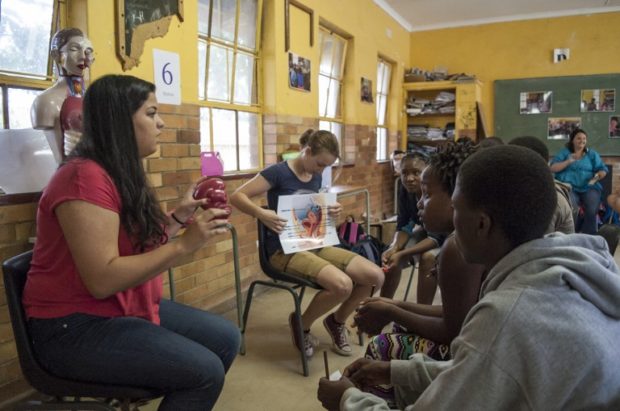Blood and fury: Menstrual activism sweeps the world

Girls from the Madibane High School in Soweto, South Africa, receive an educational talk about menstruation and female reproductive system on February 21, 2015. As sanitary pads are too expensive for many teenagers in Africa, NGOs try to find solutions and local products are made. AFP
PARIS, France — The time for being coy about the time of the month may be over.
Women are starting to speak up about their periods in a wave of “menstrual activism” which is being compared to the “women’s liberation” movement of the 1960s.
From emojis to show they are menstruating to sharing pictures of blood-stained sheets and pants on social media, a taboo that still blights the lives of millions in the developing world is being challenged as never before.
With smartphone period tracker apps booming to help women recognize the various stages of their cycle, activists say they want to lift the embarrassment from “a subject that should not be hidden”.
“We need to talk about this. We want to open a debate” about what is a normal bodily function, said Yvan Savy, of Plan International, which launched a competition earlier this year to find an emoji for a period.
A pair of knickers with two drops of blood won the contest — while the British sanitary product maker Bodyform has also submitted six more “femojis” that deal with menstruation to Unicode, the California body which decides new pictograms.
The rise of menstrual consciousness has also caught social media platforms flatfooted.
Instagram faced a furious revolt when it removed two pictures posted by cult Canadian poet Rupi Kaur showing small patches of menstrual blood on her pants and sheets two years ago.
Her 1.8 million followers applauded as Kaur railed at the hypocrisy of “a misogynist society” that sexualized women and would “have my body in underwear but (was) not OK with a small leak.”
A counter to shaming
Images of the American musician Kiran Gandhi bleeding as she crossed the finishing line after she ran the London marathon without a tampon also went viral, with many hailing her decision a radical act to counter the “shaming”.
While surveys show many women in the West are still uncomfortable discussing the subject, in India and large swathes of Africa prejudice and myths around menstruation, as well as a lack of girl-friendly toilet facilities keeps millions “away from school when they are having their periods”, Savy said.
In Ethiopia, half of girls are forced to stay at home up to four days a month, while in Uganda girls lose a fifth of their schooling, according to Plan International.
In Bangladesh, the group said girls faced “widespread shame, silence and physical restrictions during menstruation.”
Neighboring Nepal banned an ancient Hindu practice called chhaupadi in August that banishes women from the home during menstruation.
Many communities there view menstruating women as impure and in some remote areas they are forced to sleep in a hut away from home during their periods.
While Plan International believes education and better access to washing facilities and sanitary products in poorer countries can help hugely, others insist that prejudices have to be tackled head-on.
Professor Christina Bobel, of University of Massachusetts and president of the Society for Menstrual Cycle Research, told AFP that “until we dispel the myths associated with menstruation and bring much needed visibility to this biological process, its social meanings as dirty, embarrassing problem to be solved, will persist.”
“We have to attack the shame and secrecy, we have to make menstruation visible. Until we do, products — no matter how hi-tech or widely available — will not change the way to encounter our bodies as the rich and wonderful resources they are,” she added.
‘I’m only bleeding’
Even in the most supposedly feminist of societies, the subject can still be divisive. Images of menstruating ice skaters on the Stockholm metro — “It’s Alright (I’m Only Bleeding)” — by Swedish artist Liv Stromquist were defaced this month after they were denounced on social media as “disgusting”.
“It is so shocking for us as a society to see menstrual blood. It’s polarizing,” said Gandhi after her tampon-less marathon run.
Yet Bodyform was almost universally praised for breaking with tradition in its adverts by using blood-red fluid instead of the traditional blue liquid to show how absorbant its sanitary towels were.
Manufacturers, however, are also being called to account over the prices of their products as well as to reveal what chemicals are used in their manufacture, and the environmental cost of disposing of them.
“Period poverty” has become a hot political issue, with Britain’s opposition Labor party promising to provide free sanitary towels to schools, homeless shelters and food banks if it comes to power.
But it is in the developing world that the biggest steps need to be taken, said Plan International, pointing to KmerPad, a Cameroon-based company, which makes low-cost washable organic protection for the local market.
The push comes as younger women in the West have become more suspicious of attempts to control “women’s reproduction by chemical methods such as the (contraceptive) pill,” according to Alana Harris, a historian of sex and religion at King’s College, London.
Her show “Period Piece: Telling Menstrual Tales”, now at the Science Gallery in the British capital, explores “this fraught and freighted emotional landscape”.
“It seems to me that the ubiquitous nature of these apps is facilitating more frank and better-informed conversations amongst women and men about our bodies and blood,” she said. /cbb